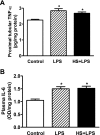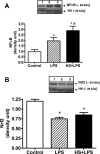Inflammation compromises renal dopamine D1 receptor function in rats
- PMID: 19794106
- PMCID: PMC2801341
- DOI: 10.1152/ajprenal.00366.2009
Inflammation compromises renal dopamine D1 receptor function in rats
Abstract
We tested the effects of inflammation on renal dopamine D1 receptor signaling cascade, a key pathway that maintains sodium homeostasis and blood pressure during increased salt intake. Inflammation was produced by administering lipopolysaccharide (LPS; 4 mg/kg ip) to rats provided without (normal salt) and with 1% NaCl in drinking water for 2 wk (high salt). Control rats had saline injection and received tap water. We found that LPS increased the levels of inflammatory cytokines, interleukin-6, and tumor necrosis factor-alpha in the rats given either normal- or high-salt intake. Also, these rats had higher levels of oxidative stress markers, malondialdehyde and nitrotyrosine, and lower levels of antioxidant enzyme superoxide dismutase in the renal proximal tubules (RPTs). The nuclear levels of transcription factors NF-kappaB increased and Nrf2 decreased in the RPTs in response to LPS in rats given normal and high salt. Furthermore, D1 receptor numbers, D1 receptor proteins, and D1 receptor agonist (SKF38393)-mediated (35)S-GTPgammaS binding decreased in the RPTs in these rats. The basal activities of Na-K-ATPase in the RPTs were similar in control and LPS-treated rats given normal and high salt. SKF38393 caused inhibition of Na-K-ATPase activity in the primary cultures of RPTs treated with vehicle but not in the cultures treated with LPS. Furthermore, LPS caused an increase in blood pressure in the rats given high salt but not in the rats given normal salt. These results suggest that LPS differentially regulates NF-kappaB and Nrf2, produces inflammation, decreases antioxidant enzyme, increases oxidative stress, and causes D1 receptor dysfunction in the RPTs. The LPS-induced dysfunction of renal D1 receptors alters salt handling and causes hypertension in rats during salt overload.
Figures






References
-
- Aperia AC. Intrarenal dopamine: a key signal in the interactive regulation of sodium metabolism. Annu Rev Physiol 62: 621–647, 2000 - PubMed
-
- Asghar M, George L, Lokhandwala MF. Exercise decreases oxidative stress and inflammation and restores renal dopamine D1 receptor function in old rats. Am J Physiol Renal Physiol 293: F914–F919, 2007 - PubMed
Publication types
MeSH terms
Substances
Grants and funding
LinkOut - more resources
Full Text Sources
Miscellaneous

